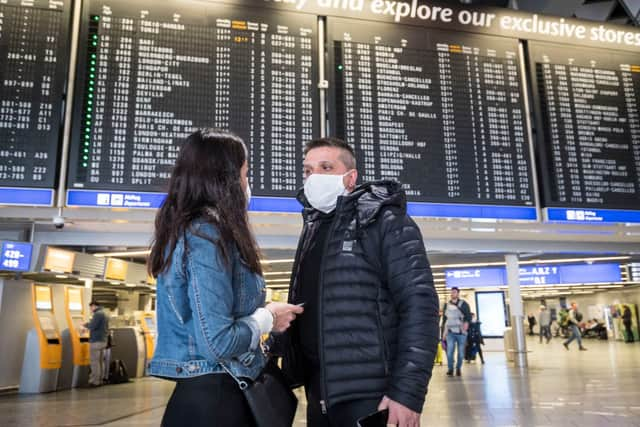LV has suspended its travel cover because of coronavirus - here's what it means


As coronavirus continues to spread, a major insurance provider has stopped offering travel cover.
LV, the company previously known as Liverpool Victoria, has roughly 5 million customers.
Advertisement
Hide AdAdvertisement
Hide AdThis comes after Aviva, one of the UK’s biggest insurance providers, restricted the cover offered by their travel policies.
Here’s everything you need to know.
Why have LV stopped offering travel insurance?
The insurance company have reportedly seen sales of their travel insurance policies double in recent weeks as customers try to protect themselves from the disruption caused by coronavirus.
Rather than increase their prices to enable them to handle the rise in demand, they have elected to stop providing the policies for the time being.
Customers who purchased travel insurance policies from LV prior to this decision will still be covered.
Advertisement
Hide AdAdvertisement
Hide AdThe decision will apparently be kept under review but there is no confirmation as to when they will begin providing travel insurance again.
What have LV said about the decision?
A spokesperson for the company said that "In light of the impact that Coronavirus (COVID-19) is having globally, we've made the difficult decision to pause the sale of travel insurance to new customers.
"We considered a number of different options, such as excluding cover or significantly increasing prices for new customers. We strongly believe this temporary measure of pausing the sale of new policies and focusing on our existing customers is the right decision."
How are other insurance providers responding to the outbreak?
Aviva have announced that while they will continue to provide travel insurance but that customers will not be able to add cover for disruption to their journeys.
Advertisement
Hide AdAdvertisement
Hide Ad"We have decided to adjust our cover to reflect the current risks posed by coronavirus” an Aviva spokesperson said.
This means that if the UK Foreign Office advises against travelling to further countries, the customer would now not be able put in a claim under the travel disruption clause. However, if their flight was cancelled as a result, they would be able to put a claim in under the “abandonment” clause.
Just as with LV, customers who bought policies from Aviva before the change was announced will not be affected by it and will be covered in full.
Sportscover Direct, who specialise in providing insurance for sports holidays such as skiing and mountaineering trips, have also announced that they are introducing a “coronavirus exclusion” to their policies which will have the same effect.
Advertisement
Hide AdAdvertisement
Hide AdThe company, who describe themselves as the UK’s largest online specialist sports insurance provider, posted a message on their website explaining that its insurance now “does not cover any loss, damage, liability, cost or expense of whatever nature directly or indirectly caused by, arising out of, contributed to by, or resulting from Covid-19."
A number of other insurers, including AXA UK and the RSA, have announced no changes to their policies in response to the coronavirus and continue to offer their usual level of coverage.
Coronavirus: the facts
What is coronavirus?
COVID-19 is a respiratory illness that can affect lungs and airways. It is caused by a virus called coronavirus.
What caused coronavirus?
The outbreak started in Wuhan in China in December 2019 and it is thought that the virus, like others of its kind, has come from animals.
How is it spread?
Advertisement
Hide AdAdvertisement
Hide AdAs this is such a new illness, experts still aren’t sure how it is spread. But.similar viruses are spread in cough droplets. Therefore covering your nose and mouth when sneezing and coughing, and disposing of used tissues straight away is advised. Viruses like coronavirus cannot live outside the body for very long.
What are the symptoms?
The NHS states that the symptoms are: a dry cough, high temperature and shortness of breath - but these symptoms do not necessarily mean you have the illness. Look out for flu-like symptoms, such as aches and pains, nasal congestion, runny nose and a sore throat. It’s important to remember that some people may become infected but won’t develop any symptoms or feel unwell.
What precautions can be taken?
Washing your hands with soap and water thoroughly. The NHS also advises to cover your mouth and nose with a tissue or your sleeve (not your hands) when you cough or sneeze; put used tissues in the bin immediately and try to avoid close contact with people who are unwell. Also avoiding touching eyes, nose and mouth unless your hands are clean.
Should I avoid public places?
Most people who feel well can continue to go to work, school and public places and should only stay at home and self isolate if advised by a medical professional or the coronavirus service.
What should I do if I feel unwell?
Advertisement
Hide AdAdvertisement
Hide AdDon’t go to your GP but instead call NHS 111 or look online at the coronavirus service that can tell you if you need medical help and what to do next.
When to call NHS 111
NHS 111 should be used if you feel unwell with coronavirus symptoms, have been in a country with a high risk of coronavirus in the last 14 days or if you have been in close contact with someone with the virus.
Sources: World Health Organisation and NHS